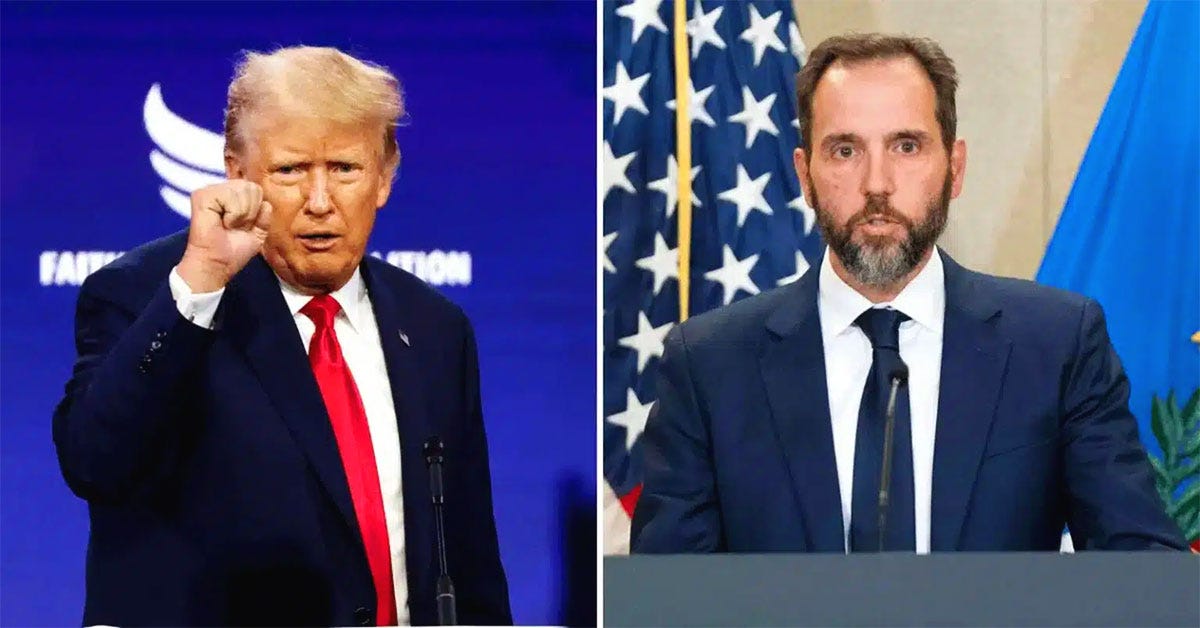Team Trump Believes SCOTUS Can Bail Him Out of His Jan. 6 Case
This is the first of what is most likely many motions to dismiss the case that Special Counsel Jack Smith has brought against Trump, accusing him of attempting to rig the 2020 election.
Martin Walsh - NOV 3, 2023
Former President Donald Trump’s attorneys filed their first motion to dismiss the federal election interference case against their client, arguing that Trump has “absolute immunity” from prosecution for actions taken while he was president.
This is the first of what is most likely many motions to dismiss the case that Special Counsel Jack Smith has brought against Trump, accusing him of attempting to rig the 2020 election.
In August, Trump pleaded not guilty to charges that he had engaged in a “criminal scheme” to overturn the results of the 2020 election by enlisting a slate of so-called “fake electors,” using the Justice Department to conduct “sham election crime investigations,” trying to enlist the vice president to “alter the election results,” and promoting false claims of a stolen election as the
The ex-president has denied all allegations and called them “a persecution of a political opponent.”
James D. Zirin, a former federal prosecutor in New York’s Southern District, published an op-ed in The Hill detailing the argument of “immunity” and how the U.S. Supreme Court could soon make a huge decision on the question at hand.
Before facing any criminal charges, Trump fought off federal lawsuits that claimed he bore civil liability for the January 6 uprising.
In four cases filed in the same courthouse as Trump’s election subversion case in Washington, D.C., two federal judges have rejected Trump’s claim of absolute immunity to dismiss these lawsuits.
The D.C. Circuit Court of Appeals is currently considering an appeal in the case of U.S. Capitol Police Officer James Blassingame, for which oral arguments were held earlier this year. While the potential outcomes of the civil and criminal cases couldn’t be more different (monetary damages and jail time, respectively), they share a central issue: whether Trump is immune from prosecution for his actions as president.
Trump’s legal team plans to raise the issue of executive immunity “very soon” in criminal court, and a source familiar with their strategy said that this pending civil appeal is the best chance of getting the Supreme Court to rule on the matter.
The gamble, if successful, could delay or even derail the criminal case, the source claims. Since a decision in Blassingame before the D.C. Circuit is possible, the stakes have been raised to the Supreme Court, The Messenger noted.
CLICK THE IMAGE TO WATCH THE VIDEO BELOW >
The story of a Black police officer who faced a barrage of racist abuse and violence while defending the United States Capitol on January 6, 2021, lies behind the case caption Blassingame v. Trump and the technical arguments over the reach of executive immunity.
After 17 years on the force, Blassingame claimed the day of the insurrection was unlike any other. Pro-Trump rioters allegedly called him the N-word “more times than he could count” and beat him “in his face, head, chest, arms, and what felt like every part of his body,” as stated in the lawsuit.
Blassingame said the attack had a “severe emotional toll” on him, and he continued to experience back pain months later. He says he got hurt because of Trump.
In February 2022, U.S. District Court Judge Amit Mehta ruled against Trump on immunity grounds in three lawsuits, including Blassingame’s.
Senior U.S. District Judge Emmet Sullivan reached a similar conclusion in a separate ruling, allowing a civil rights group’s lawsuit against Trump under the Ku Klux Klan Act, the civil analog of the Reconstruction-era civil rights law charged in Special Counsel Jack Smith’s indictment, to move forward.
Immunity “does not protect acts that Former President Trump undertook outside the outer perimeter of his official duties,” Sullivan found months later in November.
According to the source, Trump’s legal team will argue that the criminal case should not proceed until Blassingame’s lawsuit is resolved because it represents the closest precedent to appellate review.
The Trump administration filed an appeal with the D.C. Circuit Court of Appeals in August, claiming the lower court “erred when it held that President Trump’s speech on matters of public concern was not within the scope of his absolute presidential immunity.”
U.S. Circuit Judges Gregory Katsas, a Trump appointee, Judith Rogers, a Clinton appointee, and Sri Srinivasan, an Obama appointee, heard oral arguments in the case in December.
An appeals court could decide to review pre-trial motions concerning the immunity issue before his criminal cases go to trial, according to some legal experts.
The attorneys for Trump could file an interlocutory appeal, which is typically reserved for high-stakes issues before trial if they lose those motions in the lower courts and can convince an appellate court that there are unresolved legal issues to consider.
Kim Wehle, a law professor at the University of Baltimore, has speculated that appellate courts, including the Supreme Court of the United States, may make an exception in this case despite their usual reluctance to hear interlocutory appeals.
“To go to trial, if there is immunity or some other threshold basis to not go to trial, would damage the presidency itself,” Wehle told The Messenger. “Practically speaking, they’re not going to put the country through a trial when there is a valid immunity defense from the threshold, from the get-go.”






